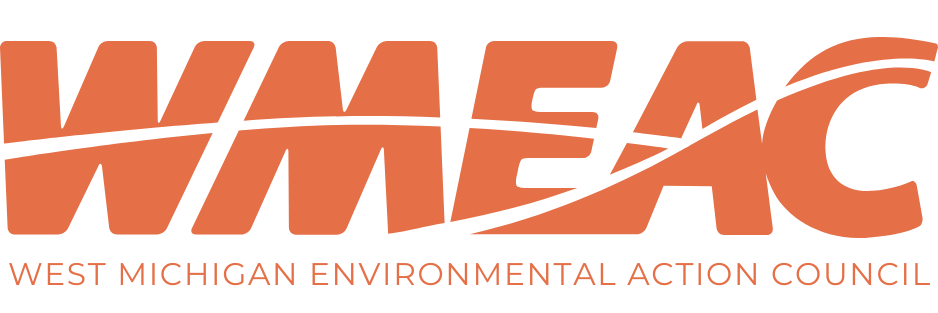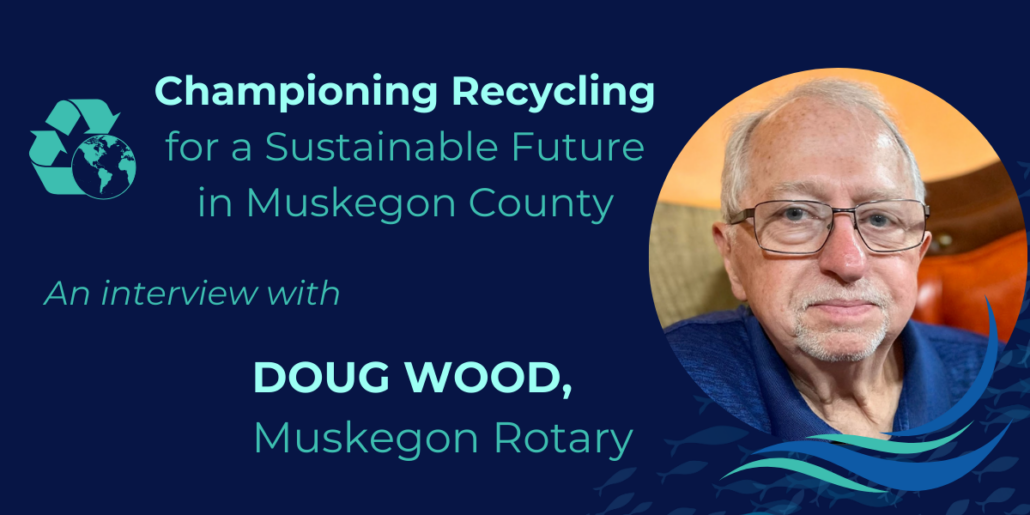By: Tanya Cabala, WMEAC Lakeshore Outreach Organizer
As we celebrate National Volunteer Week, we are thrilled to spotlight the strides made as part of the “Improving Recycling in Muskegon County” project, a new sustainability initiative in our region.
This new effort reflects the collective commitment of individuals, organizations, and local municipalities to address the pressing need for more coordinated and effective recycling. Over the past several years, the project has evolved from a vision into a robust action plan, thanks to the dedication of volunteers and community leaders.
At the helm of this transformative endeavor going forward are two commendable individuals, the co-chairs of our newly formed Recycling Leadership Team, Linda Aerts, Cedar Creek Township Supervisor and Doug Wood, of Muskegon Rotary. Their passion for improving recycling will help advance this important project forward, driving tangible change in Muskegon County.
During this week to honor volunteers, we have the honor of presenting their insights and the pivotal role they have undertaken with other members of the Recycling Leadership Team in shaping the future of recycling in Muskegon County. Moreover, we celebrate the recent milestones achieved, including a grant award from the Community Foundation for Muskegon County and the anticipated support from state-sponsored EDA grants, poised to provide essential resources for the project’s continued success.
Please join us in honoring their leadership and exploring the potential transformative impact of the “Improving Recycling in Muskegon County” project via interviews of these two community recycling activists! You can read Linda Aerts’ interview at this link.
Doug Wood, Muskegon Rotary
Please provide a brief bio of who you are, what you are doing currently, and how that relates to your volunteer role associated with improving recycling in Muskegon County.
I am a retired educator who was born in Muskegon and raised in Fruitport. While at Fruitport High School, I became interested in the sciences and environment under the instruction of teacher John Sluka. Sluka taught his students the importance of environmental activism.
I received a degree in biology education at Western Michigan University. After marrying my wife Kim, we moved to Kalamazoo and lived there 32 years, raising two children. Kalamazoo also taught our family the importance of a recycle/reuse lifestyle as there were many resources available there.
Upon returning home in 2008, we lived in the Fruitland Township area and took full advantage of the recycling opportunities provided by the transfer station there. Upon moving to North Muskegon, the lack of such facilities made recycling more expensive and far less convenient.
These experiences have had much to do with my interest in the enhancement of recycling opportunities in Muskegon County.
We will be receiving local and state support to begin to tackle 3 recommendations of a recent feasibility study – getting municipalities together for potential partnerships and cost savings, creating a basic recycling education campaign, including highlighting updated information on the county’s recycling services and facilities – what we have, and getting assistance to create a conceptual model of what comprehensive coverage would like, what we could have as we advance improvements in recycling. Why do you think these projects are important to Muskegon County?
As part of any future comprehensive recycling system, the response to these three recommendations form the foundation for success.
- The web of municipalities and neighborhoods that make Muskegon County a unique place to live can also provide challenges to providing services to ALL county residents.
- An agreement among the governmental units can demonstrate a common goal to serve the common good in providing quality recycling services throughout the area.
- The creation of a quality, comprehensive, recycling system will rely on many factors. But effective recycling depends on the participation of the individual, family, businesses, and organizations to make the commitment to recycle and reuse whenever possible. To do that, we all need the skills and knowledge that are required for recycling to be most effective. We must all be learners in this effort.
- The adage of “not recreating the wheel” will apply as we go forward. There are many examples of effective recycling systems from which we can learn. And yet, Muskegon County is likely to provide its own challenges and wrinkles. There is expertise available to help us determine what is best for our community and to help us design the system most likely to work.
Given that your time on the Recycling Leadership Team has been relatively short, what do you hope overall to see the effort accomplish?
The team has some dynamic leaders serving this effort. They have demonstrated a caring for the Muskegon community and the ability to solve important problems. I hope to see those skills and passions brought to bear on the recycling issue.
As the work expands, I hope we can build expertise and capacity in the recycling area. This will mean building leadership in all areas of the county, urban and rural. It will mean sharing what we learn across political boundaries we may not be used to crossing.
Above all, I hope we can demonstrate the innovation and commitment to designing and operating a recycle and reuse system that other communities will look to as an example.
Anything else?
Thank you to the support provided by WMEAC in this work. Also, to Tanya Cabala, Linda Aerts, and others who have their “boots on the ground” in their commitment to the environmental integrity of Muskegon County.


